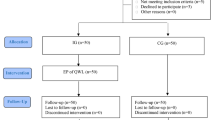Abstract
This study aimed to assess the effect of an educational intervention for preparing close-to-retirement employees for their retirement. This randomized pre/post interventional study was conducted among 140 employees of Kerman University of Medical Sciences. The 70 employees in the intervention group were educated in four 4 h sessions, including health, leisure time, and financial needs. The instrument used was the Retirement Syndrome Questionnaire. Findings show that feelings of helplessness and failure and oldness and idleness significantly decreased after the educational intervention, and feelings of effort and a new direction significantly increased. The educational intervention led to the improvement of retirement syndrome in the studied population. Therefore, to help them adjust to retirement, it is essential to consider retirees’ challenges and increase their awareness about retirement requirements by providing social support and educational courses.
Similar content being viewed by others
REFERENCES
Alvarenga, L.N., Kiyan, L., Bitencourt, B., and Wanderley, K.d.S., Repercussões da aposentadoria na qualidade de vida do idoso, Revista da Escola de Enfermagem da USP, 2009, vol. 43, no. 4, pp. 796–802.
Barnett, I., van Sluijs, E.M., and Ogilvie, D., Physical activity and transitioning to retirement: a systematic review, Am. J. Prev. Med., 2012, vol. 43, no. 3, pp. 329–336.
Butterworth, P., Gill, S.C., Rodgers, B., et al., Retirement and mental health: analysis of the Australian national survey of mental health and well-being, Soc. Sci. Med., 2006, vol. 62, no. 5, pp. 1179–1191.
Cahill, K.E., Giandrea, M.D., and Quinn, J.F., Retirement patterns from career employment, Gerontologist, 2006, vol. 46, no. 4, pp. 514–523.
Dave, D., Rashad, I., and Spasojevic, J., The effects of retirement on physical and mental health outcomes, National Bureau of Economic Research, South. Econ. J., 2008, vol. 75, no. 2, pp. 497–523.
De los Ángeles Aguilera, M., De Jesús Púrez, J., Delgado, D., et al., Educational preparation of older adults and their families for retirement, Adv. Appl. Soc., 2013, vol. 3, no. 6, p. 237.
De los Ángeles, A.V.M., Santos, M.d.L.M., Fernández, M.A., and López, T.M.T., Strategies of awareness of the retirement in employees of a Mexican company, Open J. Soc. Sci., 2018, vol. 6, no. 6, pp. 119–131.
De Vries, M.K., The retirement syndrome: the psychology of letting go, Eur. Manage. J., 2003, vol. 21, no. 6, pp. 707–716.
Golab, S. and Bazzazan, F., The effects of parametric reforms on retirees’ welfare and financial sustainability of the Social Security Organization pension system, Refahj, 2020, vol. 20, no. 76, pp. 237–269.
Golparvar, M., Bozorgmehri, K., and Kazemi, M.S., Integrative relationship between retirement syndromes components with general health symptoms among retired adults, Iran. J. Ageing, 2011, vol. 6, no. 2, pp. 1–10.
Hansson, I., Buratti, S., Thorvaldsson, V., et al., Changes in life satisfaction in the retirement transition: interaction effects of transition type and individual resources, Work, Aging Retirement, 2018, vol. 4, no. 4, pp. 352–366.
Haslam, C., Steffens, N.K., Branscombe, N.R., et al., The importance of social groups for retirement adjustment: evidence, application, and policy implications of the social identity model of identity change, Soc. Iss. Policy Rev., 2019, vol. 13, no. 1, pp. 93–124.
Hershey, D.A. and Henkens, K., Impact of different types of retirement transitions on perceived satisfaction with life, Gerontologist, 2014, vol. 54, no. 2, pp. 232–244.
Lancee, B. and Radl, J., Social connectedness and the transition from work to retirement, J. Gerontol. Ser. B: Psychol. Sci. Soc. Sci., 2012, vol. 67, no. 4, pp. 481–490.
Montalvo Reyna, J., Nápoles Rodríguez, O., Espinosa Salcido, M.R., and González Montoya, S., Efectos cualitativos de una técnica de PNL en la dependencia emocional de pareja, Rev. Electrón. Psicol. Iztacala, 2011, vol. 14, no. 1, pp. 25–35.
Nobahar, M., Ahmadi, F., Alhani, F., and Fallahi-Khoshknab, M., Coping to retirement: a review article, Iran. J. Psych. Nurs., 2013, vol. 1, no. 2, pp. 38–53.
Nobahar, M., Ahmadi, F., Alhani, F., and Fallahi Khoshknab, M., Designing an adaptation model for retired nurses, Iran J. Nurs., 2012, vol. 24, no. 74, pp. 37–47.
Stolzenberg, R.M. and Lindgren, J., Retirement and death in office of US Supreme Court justices, Demography, 2010, vol. 47, no. 2, pp. 269–298.
Sum, S., Mahmoodi, Y., and Tirgar, A., Retirement syndrome among Babol city retirees, Iran. J. Ageing, 2015, vol. 10, no. 3, pp. 100–109.
Wang, M. and Shi, J., Psychological research on retirement, Ann. Rev. Psychol., 2014, vol. 65, no. 1, pp. 209–233.
Warr, P., Butcher, V., Robertson, I., and Callinan, M., Older people’s well-being as a function of employment, retirement, environmental characteristics and role preference, Br. J. Psychol., 2004, vol. 95, no. 3, pp. 297–324.
Westerlund, H., Vahtera, J., Ferrie, J.E., et al., Effect of retirement on major chronic conditions and fatigue: French GAZEL occupational cohort study, Brit. Med. J., 2010, vol. 14, p. 341.
Yektatalab, S., The effect of psychoeducational intervention on retirement syndrome among retired nurses: a field trial, Online J. Health and Allied Sci., 2017, vol. 16, no. 4, р. 8.
Zhan, Y., Wang, M., Liu, S., and Shultz, K.S., Bridge employment and retirees’ health: a longitudinal investigation, J. Occupat. Health Psychol., 2009, vol. 14, no. 4, р. 374.
ACKNOWLEDGMENTS
The authors are grateful for the support and cooperation of the staff of Kerman University of Medical Sciences.
Author information
Authors and Affiliations
Corresponding author
Ethics declarations
Conflict of interest. The authors declare that they have no conflicts of interest.
Statement of compliance with standards of research involving humans as subjects. Ethical approval was obtained from the Kerman University of Medical Sciences (Reff no. IR.KMU. REC.1396.2272). Informed consent was obtained from all individual participants involved in the study.
Rights and permissions
About this article
Cite this article
Najafipour, H., Sepehri, G.H., Saberi, S.H. et al. Design and Evaluation of an Educational Intervention to Prepare Close-to-Retirement Employees for Retirement. Adv Gerontol 12, 162–167 (2022). https://doi.org/10.1134/S2079057022020138
Received:
Revised:
Accepted:
Published:
Issue Date:
DOI: https://doi.org/10.1134/S2079057022020138




